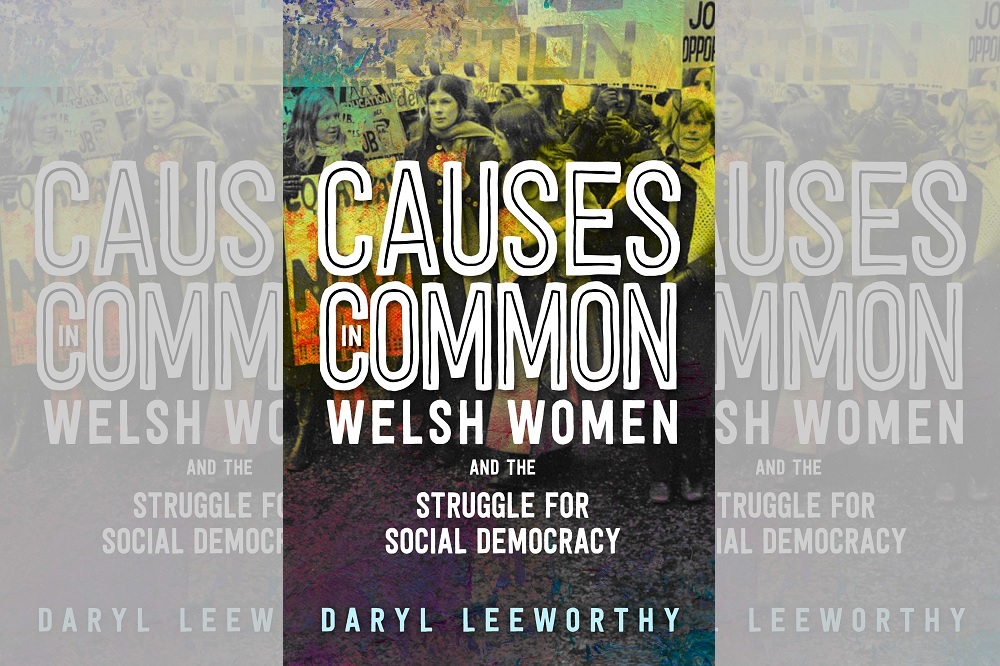Review: Causes In Common by Daryl Leeworthy

Philippa Davies
Until the Jackie Weaver ‘I have the authority’ story, and her star role in the 2021 Handforth parish council viral video, women who work behind the scenes in local democracy have rarely made the news.
Now a new book, ‘Causes in Common’ by Daryl Leeworthy, shines a light on little known women active in the women’s movement in Wales.
The author, research fellow at Swansea University’s South Wales Miners’ Library, argues for the commitment of the Welsh women’s movement to social democracy, rather than liberal or conservative alternatives, and that material conditions were the motivation for this.
The book opens with the story of Dorothy Rees, who at 51 years old was the first working-class woman sent by a Welsh electorate to represent them in Westminster.
In her parliamentary speeches, Dorothy was clear about her identity: ‘I speak as a housewife’ she announced in her first speech on 13th March 1950, and in her second major speech later on that year: ‘I am a docker’s daughter and have lived among the dock workers all my life’.
But as the author points out, Dorothy was much more than this. Born and raised in Barry, she was a qualified schoolteacher, a district and county councillor, agent for Barry and Llandaff Constituency Labour Party and:
‘Before her eventual retirement, she served on almost every major public body in Wales, from the Welsh Joint Education Committee, to the Welsh Teaching Hospitals Management Board, to the BBC…In 1964, Dorothy Rees was awarded a CBE for services to local administration. A damehood following in 1975’.
Daryl Leeworthy contends that it’s remarkable there has never been a full-length biography of Dorothy Rees, or indeed a one volume study of the women’s movement which helped women such as Dorothy.
And he argues that this lack of consideration of working-class women contrasts strongly with the attention to paid to upper and middle class women, like Lady Rhondda and Amy Dillwyn, and also sidelines the contribution of the Labour Party.
Life Stories And Friendly Societies
To this non-historian, the author makes a wise choice of constructing each chapter around life stories, which show how the collective action of women, organisations they joined and the significance of what they did link together.
In his chapter ‘Before the Vote’, he describes friendly societies which women in Wales belonged to in their tens of thousands in the nineteenth century.
These have some great names: Faithful Female Friendly Society, Ancient Order of Foresters – with officers’ titles including Beadle and Chief Ranger – and Philanthropic Order of True Ivorites, who conducted their business entirely in Welsh.
Best of all is the Independent Order of Oddwomen, who used a beehive logo and marching banners with slogans such as ‘sisterly love’ and ‘peace and plenty to all’.
This reader is inspired to persuade her fellow book club members that a revival of the Independent Order of Oddwomen is well overdue.
Coming into the twentieth century, the book describes the Labour Party women’s fight for nursery education. But not everyone agreed:
The women’s section of Caerphilly Labour Party, for example, resisted provision of nurseries in that part of the coalfield on the basis that ‘the woman comrades thought it would tend to give mothers more time to gossip’.
In describing this struggle to get nursery education, we’re reminded how many women involved in the Labour Party’s women sections did not stand for office, either as councillors, potential MPs or branch officers and committee members, but stayed anonymous and beavering away in the background, with either contribution records lost or never existing.
Historic tension
Depicting some of the historic tension between Labour and the Communist Party in parts of Wales, the author tells the story of Ceridwen Brown, Communist leader during the inter-war period, and distinctively dressed in red beret and trench coat, following visits to Moscow.
Her activity monitored by the police, regarded as ‘a menace and significant danger to public order’, Ceridwen ended up addressing a crowd of 3000 in the Merthyr coal field protests in February 1935.
When chosen to be Communist Party parliamentary candidate in Aberdare, sadly illness from starvation, and grief from the loss of a daughter prevented her standing.
Coming up to more recent times, we learn how some women’s movement members decided to operate pragmatically, within political parties and government rather than outside them:
‘As Jane Hutt has recalled, we had to influence government in terms of women’s issues and women’s needs [and] to me it became more and more obvious that one had to make the decision…and I suppose that is the step I made, and I am certainly not the only one’.
In its thoroughness, ample footnotes and attention to detail and context, this is a book aimed I suspect at an academic reader – which I am not.
Yet there is much to enjoy here from the vivid stories of these unsung trailblazers, and the depiction of familiar tensions between chapel, politics, idealism and pragmatism in Welsh history.
Fittingly the author ends with a quote from Elaine Morgan, evolutionary theorist and screenwriter, whose statue was unveiled in Mountain Ash earlier this year.
One of his previous publications is a biography of Elaine Morgan and I look forward to reading this, next.
Causes in Common is published by University of Wales Press and can be bought here
Support our Nation today
For the price of a cup of coffee a month you can help us create an independent, not-for-profit, national news service for the people of Wales, by the people of Wales.





